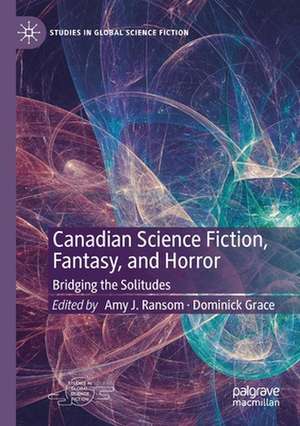Canadian Science Fiction, Fantasy, and Horror: Bridging the Solitudes: Studies in Global Science Fiction
Editat de Amy J. Ransom, Dominick Graceen Limba Engleză Paperback – 14 aug 2020
| Toate formatele și edițiile | Preț | Express |
|---|---|---|
| Paperback (1) | 700.29 lei 6-8 săpt. | |
| Springer International Publishing – 14 aug 2020 | 700.29 lei 6-8 săpt. | |
| Hardback (1) | 704.04 lei 6-8 săpt. | |
| Springer International Publishing – 7 iun 2019 | 704.04 lei 6-8 săpt. |
Preț: 700.29 lei
Preț vechi: 823.86 lei
-15% Nou
Puncte Express: 1050
Preț estimativ în valută:
134.04€ • 145.65$ • 112.67£
134.04€ • 145.65$ • 112.67£
Carte tipărită la comandă
Livrare economică 21 aprilie-05 mai
Preluare comenzi: 021 569.72.76
Specificații
ISBN-13: 9783030156879
ISBN-10: 3030156877
Pagini: 380
Ilustrații: XII, 380 p. 1 illus.
Dimensiuni: 148 x 210 mm
Greutate: 0.51 kg
Ediția:1st ed. 2019
Editura: Springer International Publishing
Colecția Palgrave Macmillan
Seria Studies in Global Science Fiction
Locul publicării:Cham, Switzerland
ISBN-10: 3030156877
Pagini: 380
Ilustrații: XII, 380 p. 1 illus.
Dimensiuni: 148 x 210 mm
Greutate: 0.51 kg
Ediția:1st ed. 2019
Editura: Springer International Publishing
Colecția Palgrave Macmillan
Seria Studies in Global Science Fiction
Locul publicării:Cham, Switzerland
Cuprins
1 Introduction: Bridging the Solitudes as a Critical Metaphor, Amy J. Ransom and Dominick Grace.- 2. Colonial Visions: The British Empire in Early Anglophone and Francophone Canadian Science Fiction and Fantasy, Allan Weiss.- 3. Nevermind the Gap: Judith Merril Challenges the Status Quo, Ritch Calvin.- 4. Two Solitudes, Two Cultures: Building and Burning Bridges in Peter Watts’ Novels, Michele Braun.- 5. The Affinity for Utopia: Erecting Walls and Building Bridges in Robert Charles Wilson’s The Affinities Graham Murphy.- 6. The Art of Not Dying. Emily St. John Mandel’s Station Eleven and Catherine Mavrikakis’ Oscar De Profundis Patrick Bergeron.- 7. When Are We Ever at Home?: Exile and Nostalgia in the Work of Guy Gavriel Kay, Susan Johnston.- 8. Reconciliation, Resistance and Biskaabiiyang: Re-Imagining Canadian Residential Schools in Indigenous Speculative Fictions, Judith Leggatt.- 9. Indigenous Futurist Film: Speculation and Resistance in Jeff Barnaby’s Rhymes for Young Ghouls and File Under Miscellaneous, Kristina Baudemann.- 10. Building Hope through Community in Élisabeth Vonarburg’s Maerlande Chronicles, Caroline Mosser.- 11.Cruising Canadian SF’s Queer Futurity: Hiromi Goto’s The Kappa Child and Larissa Lai’s Salt Fish Girl, Wendy Gay Pearson.- 12.Crossing the (Trans)Gender Bridge: Exploring Intersex and Trans Bodies in Canadian Speculative Fiction, Evelyn Deshane.- 13. A Maelstrom of Replication: Peter Watts’ Glitching Textual Source Codes, Ben Eldridge.- 14. The Missing Link: Bridging the Species Divide in Margaret Atwood’s MaddAddam Trilogy, Dunja Mohr.- 15. ‘I can’t believe this is happening!’: Bear Horror, the Species Divide, and the Canadian Fight for Survival in a Time of Climate Change, Michael Fuchs.- 16. Interacting and Cohabiting with Humans, Earthlings, and Others in SFQ, Isabelle Fournier.- 17. Holes Within and Bridges Beyond: The Transfictions of Élisabeth Vonarburg and Michel Tremblay, Sylvie Bérard.- 18. Tropes Crossing: On Some Québec Sf Writers from the Mainstream, Sophie Beaulé.- 19. Transculture, Transgenre: Stanley Péan’s Fantastic Detective Fiction, Kathleen Kellett.- 20. [Excerpts from A Glossary of Non-Essential Forms and Genres in English-Canadian Literature], Jordan Bolay.
Recenzii
“Amy J. Ransom and Dominick Grace have done a fantastic job with this volume, putting together a comprehensive, in-depth milestone that serves both as a valid introduction to the field of Canadian SFF and a towering critical work within it, which conveys the key conversations, opens up many avenues for research, and transmits a strong sense of enthusiasm for delving into the underreported yet clearly rewarding field of Canadian SFF.” (Daniel Lukes, Fafnir – Nordic Journal of Science Fiction and Fantasy Research, Vol. 7 (2), 2020)
“Ransom and Grace’s introduction is commendable for its illuminating survey of historical and recent developments in Canadian sf/f criticism and will be useful to both veterans and newcomers to the field. … this volume deserves a lot of credit for successfully representing diversity and contemporariness while not losing sight of the Canadian sf/f canon.” (Moritz Ingwersen, Science Fiction Studies, Vol. 47, 2020)
“Ransom and Grace’s introduction is commendable for its illuminating survey of historical and recent developments in Canadian sf/f criticism and will be useful to both veterans and newcomers to the field. … this volume deserves a lot of credit for successfully representing diversity and contemporariness while not losing sight of the Canadian sf/f canon.” (Moritz Ingwersen, Science Fiction Studies, Vol. 47, 2020)
Notă biografică
Amy J. Ransom is Chair of World Languages and Cultures at Central Michigan University, USA. She has published over two dozen articles on Québécois popular genre literatures and film and is the author of Science Fiction from Québec (2009) and Hockey PQ (2014).
Dominick Grace is Professor of English at Brescia University, Canada. He is the author of The Science Fiction of Phyllis Gotlieb (2015) and several articles on Canadian literature of the fantastic, and coeditor of several collections of interviews with cartoonists, a volume on Canadian comics, and a volume on Twin Peaks.
Dominick Grace is Professor of English at Brescia University, Canada. He is the author of The Science Fiction of Phyllis Gotlieb (2015) and several articles on Canadian literature of the fantastic, and coeditor of several collections of interviews with cartoonists, a volume on Canadian comics, and a volume on Twin Peaks.
Textul de pe ultima copertă
Canadian Science Fiction, Fantasy, and Horror: Bridging the Solitudes exposes the limitations of the solitudes concept so often applied uncritically to the Canadian experience. This volume examines Canadian and Québécois literature of the fantastic across its genres—such as science fiction, fantasy, horror, indigenous futurism, and others—and considers how its interrogation of colonialism, nationalism, race, and gender works to bridge multiple solitudes. Utilizing a transnational lens, this volume reveals how the fantastic is ready-made for exploring, in non-literal terms, the complex and problematic nature of intercultural engagement.
Caracteristici
Focuses exclusively on Canadian texts Provides a framework for understanding the Canadian fantastic Explores timely themes especially posthumanism and transnationalism












